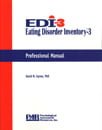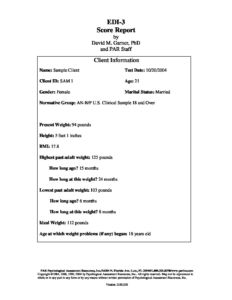
Eating Disorder Inventory-3 edi-3
For: Provides a standardised clinical evaluation of symptomatology associated with eating disorders in ages 13-53 years
Reading Level: Adolescent - Adult
Format: Paper-and-Pencil
Length: 20 minutes
Scoring: Hand Scored
Online Forms, Reports, Kits & e-Manuals
All online resources including Forms, Reports, i-Admins, Kits and e-Manuals.
Printed Kits
Click to browse products
Printed Forms & Handscoring Materials
Test forms, response booklets and scoring reference manuals.
EDI-3 online Score Report (each) min order 5
EDI-3 online i-Admin (each) min order 5
EDI-3 Introductory Kit
EDI-3 Referral Form Kit
EDI-3 Answer Sheets (25)
EDI-3 Item Booklets (25)
Online Administration & Scoring Platform Available!
Author
David M. Garner, PhD
Description
The EDI-3 is a revision of one of the most widely used self-report measures of psychological traits or constructs shown to be clinically relevant in individuals with eating disorders -the EDI-2. This new version is a standardised and easily administered measure yielding objective scores and profiles that are useful in case conceptualisation and treatment planning for individuals with a confirmed or suspected eating disorder. It also is a valuable research tool for assessing areas of psychopathology, identifying meaningful patient subgroups, and assessing treatment outcome. It may be completed in a relatively brief period of time and may be administered either individually or in a group setting.
The EDI-3 has been significantly enhanced to provide scales and composites for measuring constructs that are more consistent with the psychological domains identified as relevant to eating disorders by modern theories. The item set from the original EDI, as well as items from the 1991 revision (EDI-2), have been carefully preserved so that clinicians and researchers can continue to compare data collected previously with data from the revised EDI-3.
The EDI-3 consists of 91 items organised onto 12 primary scales, consisting of 3 eating-disorder-specific scales and 9 general psychological scales that are highly relevant to, but not specific to, eating disorders. It also yields six composites: one that is eating-disorder specific (i.e., Eating Disorder Risk) and five that are general integrative psychological constructs (i.e., Ineffectiveness, Interpersonal Problems, Affective Problems, Overcontrol, General Psychological Maladjustment).
Normative Groups
The EDI-3 provides normative information for females with eating disorders who are aged between 13-53 years. All normative protocols were collected in various outpatient and inpatient settings. Normative information is provided for the following DSM-IV-TR diagnostic groups: (a) Anorexia Nervosa-Restricting type; (b) Anorexia Nervosa-Binge-Eating/Purging type; (c) Bulimia Nervosa; and (d) Eating Disorders Not Otherwise Specified.
Reliability and Validity
The Eating Disorder Risk Composite reliability ranges from .90-.97 (median = .94) across the four diagnostic groups and the three normative groups. For the three Eating Disorder Risk scales, all reliabilities are generally in the high .80s to low .90s across the normative groups. Additionally, the reliabilities for the Psychological scales and composites are high; the overall General Psychological Maladjustment Composite range from .93-.97 across the three normative groups. With one exception, all of the other composite reliabilities are in the .80s-.90s for the normative samples.
Overall, the test-retest stability coefficients are excellent. The Eating Disorder Risk Composite coefficient is .98 and the General Psychological Maladjustment Composite coefficient is .97. The median test-retest coefficients for the Eating Disorder Risk scales and the Psychological scales are .95 and .93, respectively.
For the Eating Disorder Risk scales, the Drive for Thinness and Body Dissatisfaction scales are highly correlated (.96 and .97, respectively) with their EDI-2 counterparts for both the U.S. adult and adolescent clinical samples.
The Professional Manual shows the relationships with a broad range of external instruments, and presents factor-analytic data that provides the internal structure of the EDI-3.
EDI-3 Symptom Checklist (EDI-3 SC)
The EDI-3 SC is an independent and structured self-report form. This form is easy to complete and provides data regarding frequency of symptoms (i.e., binge eating; self-induced vomiting; exercise patterns; use of laxatives, diet pills, and diuretics). Detailed information regarding the symptom areas assessed by the EDI-3 SC is necessary for determining whether patients meet the formal diagnostic criteria for an eating disorder.
Features
Easily administered and scored, the EDI-3 yields 12 non-overlapping scale scores and 6 composite scores that may be used to create clinically meaningful profiles that may be linked to treatment plans, specific interventions and treatment monitoring.
The EDI-3 now has clinical norms for adolescents in addition to U.S. adult and international adult clinical norms. It also provides multisite nonclinical comparison samples.
The EDI-3 Referral Form (EDI-3 RF) may be administered in clinical settings as well as high schools, colleges, athletic programs, or other non-clinical settings to assist in determining if an individual should be referred for a professional evaluation. A new EDI-3 Referral Form Manual provides information on the administration, interpretation and scoring of the EDI-3 RF.
The expanded EDI-3 Professional Manual includes extensive clinical interpretive guidelines with detailed case examples.
The easy-to-use T-Score and Percentile Profile Forms include critical item sets that allow for the development of a more meaningful clinical picture.
The EDI-3 Symptom Checklist (EDI-3 SC) assists with the systematic gathering of symptom data that may aid in determining if the DSM-IV-TR diagnostic criteria are met.
The EDI-3 demonstrates excellent reliability and validity.
The EDI-3 uses a 0-4 point scoring system that improves the reliabilities of some scales and yields a wider range of scores.
NB: Prices are in Australian dollars inclusive of GST. NZ customers need to log in to view ex-GST prices.
 NZ
NZ





